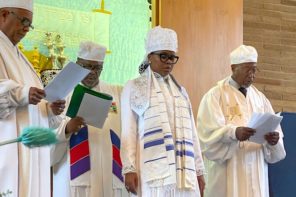Roughly once a decade, a new survey of U.S. Jews comes out, and the Tribe rediscovers how little some care about its ancient heritage, and how likely it is that, after some 3,500 years, an unbroken tradition will end in a fizzle of cheeseburgers and blondes. There’s hand-wringing. There’s counter-handwringing. There’s intelligent critique.
And, among other reactions to the Pew Forum’s recent survey of American Jewry, there are moments of polite incredulity. To wit: 34% of American Jews think that “a person can be Jewish if they believe that Jesus was the messiah.” In other words, a full third of Jewish Americans think that followers of Jesus Christ—i.e. Christians—can also be Jews.
Jews and Christians have been othering each other for centuries, and, theologically speaking, Jesus isn’t messiah material for religious Jews. So, at first glance, that number seems staggeringly high. A full third?
Once you delve into the numbers, though, 34% doesn’t seem quite so high. Really, Pew has asked an excellent question—a question that reveals the full tangle of ambiguities and inconsistencies that surround the topic of Jewish identity.
First, some background: when the researchers at Pew set out to conduct this survey, they quickly ran into a problem that’s been under discussion for at least two thousand years. As Gregory Smith, the Director of U.S. Religion Surveys at Pew, explained to me, “One of the key questions that we had to answer from a technical perspective, in terms of preparing for this survey, was, ‘Who is a Jew?’” Pew eventually found that at least a million Americans identity as Jewish, but have no Jewish ancestry. As for those with Jewish ancestry, Smith asks, “if someone has a Jewish mother and grows up and converts to Christianity, is that person still Jewish, or not?”
For survey purposes, Pew divided its respondents into a number of categories, one of which includes people of Jewish ancestry who have switched to another faith. But, Smith says, the researchers still wanted a better sense of how Jews define the borders of the community. “We thought we would put it to Jews, and see what they think.”
The messiah question appeared in a part of the survey that asked “In your opinion, can a person be Jewish if they ___.” Into that blank went “believe that Jesus was the messiah” as well as things like “do not believe in God,” “work on the Sabbath,” and “are strongly critical of the State of Israel.” Among people who were ethnically Jewish and associated in some way with the Jewish community (i.e. not Christian), accepting Jesus as the messiah, at only 34%, was far and away the most damaging prospect for one’s Jewishness. It turns out that 94% of Jews, on the other hand, are happy to keep Sabbath desecrators in the fold, and 68% are fine with the atheists.
Better to deny God’s existence altogether, it seems, than to allow Him a single son. (Read “Jewish atheist” Herb Silverman’s Pew response—particularly his joke—for more on this.) And, after centuries of persecution, it does make sense for Jews to draw a clear line between themselves and the Christian world. Still, when you look a bit closer, 34% actually starts to seem low. Pew reports that, of Jewish respondents, “62% say being Jewish is mainly a matter of ancestry and culture, while just 15% say it’s a matter of religion.” In that case, why should two-thirds of respondents deny someone’s Jewishness solely on the basis of a religious conviction? Why, in other words, should they care about the particulars of a person’s religious belief?
In certain situations, American Jews seem pretty tolerant of people who straddle Judaism and another religious tradition—witness the generally accepting attitude toward “JuBus”. As for the messiah issue, few American Jews would say that the Chabad Lubavitch Hasidim were anything other than Jewish, even though many believe that the messiah has already arrived in the form of their late Rebbe Menachem Mendel Schneerson. Obviously, Christianity comes with its own special set of connotations for Jews. But it’s important to recognize that, when it comes to messiahs and syncretism, doctrinal purity may not be American Judaism’s strong suit.
Plus, even if you are a doctrinaire, there’s a strong case to be made that, under the strictures of Jewish law, it’s possible to be both Christian and Jewish at the same time.
Sections of the law are relatively clear on this point: if your mother is Jewish, then you are Jewish, regardless of what you believe. Jews still have a rich history of apostasies and expulsions, but it’s not entirely clear whether Jewishness can be wiped away.
We should expect, then, that the Jews who answered “Yes, you can be Jewish even if you believe Jesus was the messiah” will tend to fall into two camps. They’ll either be very religious, and inclined to follow the letter of the law; or they’ll be non-religious, and think of Judaism primarily in terms of ethnicity or ancestry.
Sure enough, the survey found that “Jews of no religion,” (“also commonly called secular or cultural Jews,” Pew explains) were the likeliest to answer “yes,” with a full 47% alleging compatibility between Jewishness and belief in Jesus as the messiah. Among religiously-affiliated Jews, the ultra-Orthodox said yes most often—although that only included 35% of respondents. That percentage decreases steadily as you pass through degrees of observance: 33% of Modern Orthodox Jews; 28% of Conservative Jews. Of all Jewish subpopulations, Reform Jews were the least likely to accept any compatibility, doing so at the rate of just 25%. This denominational pattern indicates that at least some of the respondents were answering in terms of Jewish law, not theological ignorance.
Messianic Jews may also have influenced these results. It’s reasonable to expect some effect from their vocal claims that Christianity and Judaism are perfectly compatible. “There has been a shift in that more Jews today are willing to accept Messianic Jews as their brothers and sisters,” says Yaakov Ariel, a professor of religious studies at the University of North Carolina at Chapel Hill, and an expert on relationships between Messianic Jews and more conventional Semites.
“This is a sign of growing inclusivity and a growing acceptance, in some Jewish quarters, of Messianic Jews.” Could that growing inclusivity be the end of American Jewry? Last time I checked, Jews weren’t defecting to Christianity en masse. And, as J.J. Goldberg points out over at the Forward, the Pew survey indicates that America’s Jewish population is growing.
So what does this all mean? A majority of American Jews see Judaism as mainly a matter of ancestry and culture, and if you don’t believe in God you’re probably okay, but if you believe that Jesus was the messiah, forget about it, except when you’re dealing with some of the ultra-Orthodox, and also with the very-non-Orthodox, who might be cool with you because Messianic Jews have convinced them it’s all okay—which at some level might actually be Talmudically accurate… except that it’s apostasy.
Got it? Me neither. But that’s exactly the point: identity is a messy game, and inconsistencies abound. Jews have been trying to figure out their relationship to Christianity since at least the days of Paul. And Jews have been disagreeing with each other for a whole lot longer than that. If the Pew survey tells us anything, it’s that the conversation isn’t likely to end any time soon.




